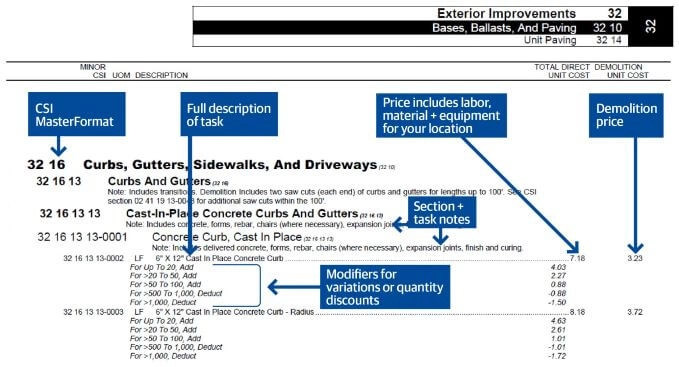Job Order Contracting (JOC) has been helping streamline construction project delivery for decades. And like any formalized process, JOC has its own terminology. Whether you’re a project owner or a contractor, it helps to be fluent in the language. So we put together a brief glossary of terms to know during JOC program implementation and JOC project execution.
Unit Price – A current, accurate and localized cost for a material, equipment or labor Task. Unit Prices are used to prepare a Price Proposal for a Job Order Contracting (JOC) project. In a Gordian JOC program, Unit Prices are collected in a project owner’s customized Unit Price Book.
Unit Price Book – The document used as the basis to competitively-award JOC contracts and price every Job Order once the contract is in place. Here at Gordian, we call our Unit Price Book a Construction Task Catalog®(CTC).
Task – A construction Task published in the Unit Price book, which includes a description of the Task, a unit of measure and a Unit Price. The image below is a sample Task from a Gordian CTC.

Non-Prepriced Task – A Task that is necessary to complete the Detailed Scope of Work but that does not appear in the Unit Price book.
Adjustment Factor – A contractor’s competitively-bid (or negotiated) adjustment to be applied to the Unit Prices listed in the Unit Price book. If a contractor’s Adjustment Factor is 1.0500 and the Unit Price for a Task is $1.00/square foot, then the contractor would be paid $1.05 for each square foot of the Task it performed.
Best Value Award – A contract award process that considers multiple selection factors beyond price. Relevant parameters may include past performance, previous construction experience, references and price. Gordian recommends using a best value award process for JOC projects if owners have the option to do so within all local statutes and requirements.
There’s a lot more to Job Order Contracting than terminology. To learn about JOC from A to Z, watch our free four-part video series, “Job Order Contracting 101.”
Joint Scope Meeting – A meeting at the project site where the owner, contractor and other project stakeholders can see the project conditions, discuss the proposed work, consider Value Engineering (VE) options and agree on the work to be performed. Other areas of discussion for the Joint Scope Meeting may include:
- The presence of hazardous materials and the testing and removal of said materials.
- Permitting.
- Protocols for workers entering and leaving the site.
- Construction schedule and work hours, with critical milestones and phasing requirements.
- Staging areas, signage and temporary fencing or partitions.
- Organization of the Price Proposal.
Detailed Scope of Work – A document written by the owner establishing the work the contractor is obligated to complete for a particular Job Order.
Price Proposal – A comprehensive rundown of the Tasks, materials, equipment and their quantities that will be used to execute the project. Completed by the awarded contractor, the Price Proposal should reflect the Detailed Scope of Work.
Job Order – A written order issued by the project owner requiring the contractor to complete the Detailed Scope of Work within the Job Order Completion Time for the Job Order Price.
Job Order Completion Time – The time within which the contractor must complete the Detailed Scope of Work.
Job Order Price – The value of the approved Price Proposal and the amount the contractor will be paid for completing the Detailed Scope of Work within the Job Order Completion Time.






